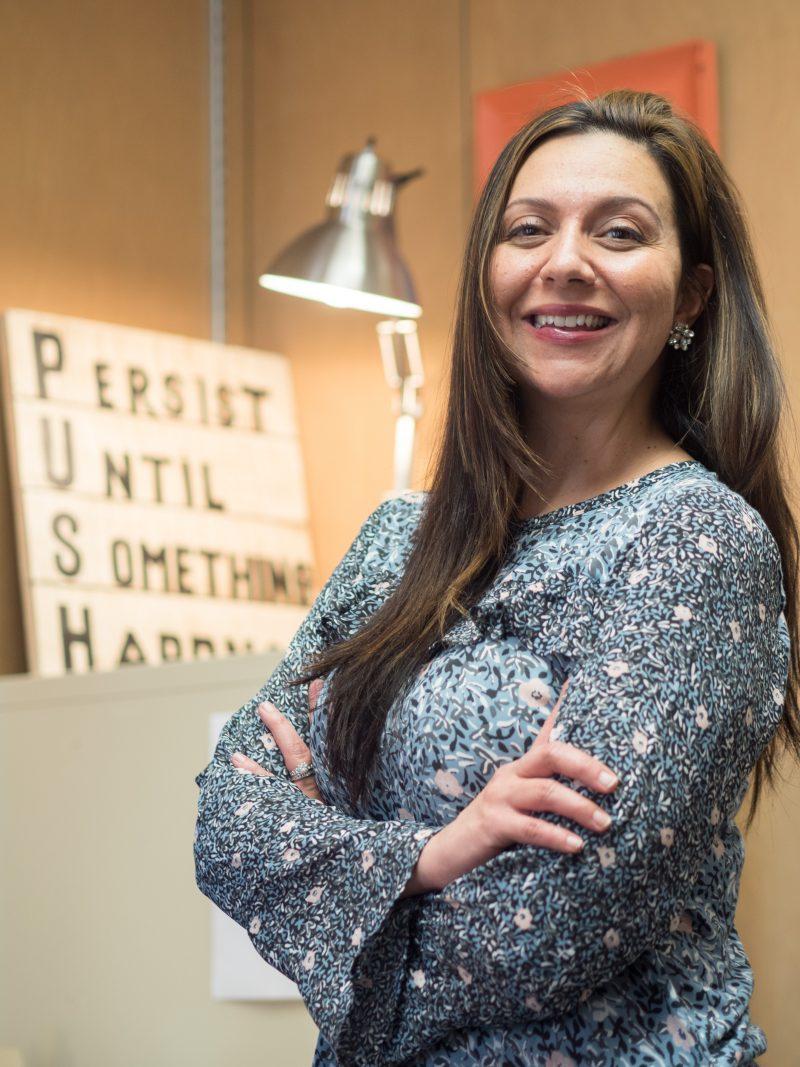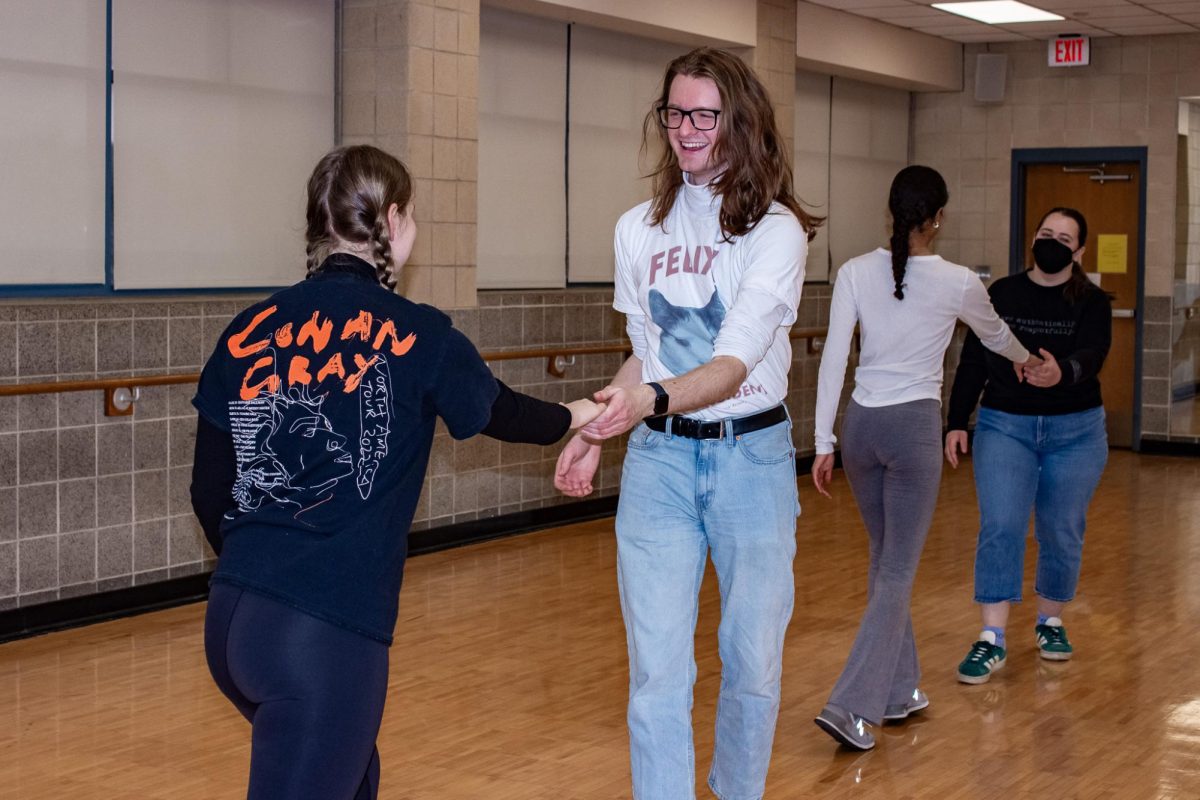Sitting in the waiting room at Counseling Services, it’s easy to see why so many students will seek emotional help here sometime during their Trinity years. Before the row of chairs is a wall of pamphlets, offering advice on handling every life problem you can imagine. Do you have eating problems? There’s a pamphlet for that. There’s also a pamphlet for dealing with your parents’ divorce and one for breaking up with a partner. Then, there’s ADD, anxiety and battling academic stress — infinite unique problems with infinite unique solutions.
The problem is, not much emotional wisdom can be contained in a single folded page. A pamphlet also can’t get to know a person and formulate a customized solution to their problem. That’s where counselors like Claudia Rodriguez Kypuros come in.
Kypuros is Counseling Services’ newest counselor. She was hired in Dec. 2017 and began working at Trinity on Jan. 8, 2018. In contrast to all of her coworkers, Kypuros’s background is in clinical social work rather than psychology.
Kypuros believes her background allows her to solve problems on a macro level, and thinks the office’s hiring her represents a shift toward diversity of thought and theoretical approach.
“I’m coming in looking at the big picture, what’s going on at the macro level that is perhaps affecting the student. I also look at the social justice piece … so, if there’s something going on within the family system, if it’s an issue of socioeconomic status, it may be bringing anxiety related to that background,“ Kypuros said.
Kypuros hails from the University of Texas at San Antonio (UTSA), where she spent ten years as a counselor. While she was working at UTSA, she also earned her Ph.D. in Counselor Education and Supervision at St. Mary’s University.
“I finished up my doctorate and graduated, and I did part-time work at UTSA, the same place,” Kypuros said. “Then I realized that I needed a break from UTSA. I’d been there for such a long time, and I thought, ‘Well, let me pursue some other things.’ ”
Kypuros then began working in a private practice, but she soon found herself missing the culture of academia. That’s when she noticed Trinity’s posting for a mental health counselor.
She was excited to see that she fit the qualifications: she had been eyeing Trinity as a potential workplace for years, but the university had not hired a new full-time counselor since 1983. What’s more, all new hires in the past had psychology backgrounds, while her background is in clinical social work.
“I said, ‘well here’s my opportunity.’ The position was for a mental health counselor, and someone who was either a [Licensed Clinical Therapist] or a [Licensed Clinical Social Worker],” Kypuros said.
She figured that this job might be a great fit.
“I remember, in December of 2017, interviewing for the position. It was all day, and it was exhausting, but it was amazing. And here I am now, so I kind of love it,” Kypuros said.
Sheryl Tynes, the Vice President for Student Life, played a role in hiring Kypuros. She explained that she was happy to see Kypuros’s enthusiasm about working for Trinity.
“She said to me after the interview process, ‘I have been aiming to work at Trinity for a long, long time.’ She really wanted to be here,” Tynes said.
In her month and a half working here so far, Kypuros has noticed that academics contribute to anxiety at Trinity far more than they do at at UTSA. She believes that Trinity’s environment poses unique mental health challenges to students.
“This is a very high-achieving population, so as such, what we treat or at least the things that students bring to counseling will be related to academic distress, for example. That’s very common. When I was at UTSA, that wasn’t necessarily what students brought in first and foremost,” Kypuros said.
The number of students who seek counseling at Trinity has drastically increased recently. According to data collected by Counseling Services, the number of individual clients seen annually increased by 83 percent between 2016 and 2017.
Director of Counseling Services, Gary Neal, explained that the office was greatly in need of a new full-time hire in order to meet demand.
“Basically our amount of work has doubled. … That happened without any increase in [full-time] counseling staff,” Neal said.
Kypuros sees the influx of students coming in as proof of decreasing stigma around seeking emotional help.
“I think that’s a big reason why we see more students coming in: It’s that they feel more comfortable accessing services,” Kypuros said.
Neal explained that another reason for hiring Kypuros was Counseling Services’ need for another female staff member. The ratio of female to male clients seen in the Fall 2017 semester was 64:36, and Counseling Services received requests to see a female counselor far more often than requests to see a man.
“This is a truism in all healthcare settings, especially mental healthcare settings. … I believe it’s clearly about socialization of men. They are reluctant to seek help in many capacities,“ Neal said.
Kypuros feels supported in her new environment. Despite Trinity’s differences from Kypuros’s former workplace, other counselors already feel like family to her, and the university has begun to feel like home.
“A lot of people I’ve met have been here for many years, and I’m starting to understand why. … My team, the people that I work with, they feel like family. The welcome has been so warm,” Kypuros said.
So, when should a student come in to Counseling Services? Kypuros recommends seeking help when mental health begins to interfere with everyday tasks or obligations.
If this describes you at all, the best first step to take is coming in during Counseling Services’ walk-in hours in Halsell 201 for an initial 20-minute consultation.







